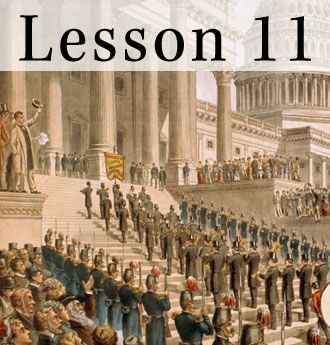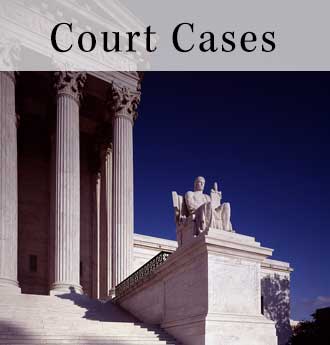Lesson 11: What Questions Did the Framers Consider in Designing the Three Branches of the National Government?
What questions did the Framers consider when designing the three branches of the national government? (Video)
Concerns with tyranny of executives and tyranny of majorities in legislatures; interest in providing for checks and balances on powers of government; issue of "national" vs. "federal" government.
Student Questions: Unit 2, Lesson 11, Sections 1-6 (pdf download)
What questions did the Framers address in organizing the legislative branch? (Video)
Concern with legislative tyranny; issue of enumerated powers and what broad powers might be necessary to implement and enforce enumerated powers; Necessary and Proper Clause; rationale for bicameral legislature; role of executive branch; checks and balances; comparison with parliamentary systems - executive controlled by party that controls legislative branch, more efficient in passing laws; U.S. system easier to stop laws from passing.
What questions did the Framers address in organizing the executive branch? (Video)
Negative experience with broad powers of British monarch; need for "energy" in the executive branch to implement legislation and deal with national emergencies; concern with how president would be elected; defined powers broadly.
What questions did the Framers address in deciding how the president should be selected? (Video)
Alternative means of selecting president included - election by the people, election by Congress, and election by a separate body - Electoral College; rationale for and representation in the Electoral College; arguments for and against the Electoral College.
What questions did the Framers address in organizing the judicial branch? (Video)
Time spent designing judiciary; issues appellate and original jurisdiction, terms for judges; lower courts in federal judiciary created by the Judiciary Act of 1789; election of judges in state constitutions; advantages and disadvantages of federal judiciary.
How well does the system of separated and shared powers and what were the principal objections of opponents of the Constitution? (Video)
Shared powers, such as treaties, impeachment, appointments; delegates' objections to Constitution - gave too much power to small states; representation of states vs. people; potentially too much power in presidency and judiciary; too much power in national government and not enough sovereignty left to the states.
Structure of the Court System (Video)
A video discussing the structure of the court system. From Crash Course.
Electing a US President in Plain English (Video)
A short guide to understanding how the U.S. elects a new president.
Electoral College Picks the President (Video)
VOA's Jeffrey Young explains that the selection of the president is actually done by the Electoral College.
History of the Three Branches of Government (Video)
A video discussing the justification for having three branches of government.
The Election Process: The Electoral College (Video)
A video about the Electoral College and how a president is elected.
American History Series: A "Great Compromise" on State Representation (Audio)
An audio description of the Great Compromise.
60-Second Civics, Episode 310: Introduction to the Three Branches of Government (Audio)
An introduction of the three branches of the U.S. government.
60-Second Civics, Episode 311: The Framers and the Balance of Power (Audio)
What were the delegates' thoughts on the balance of power?
60-Second Civics, Episode 312: Problems with a Weak Executive (Audio)
Colonial Americans preferred a weak executive, but at what cost?
60-Second Civics, Episode 313: Congress as a Deliberative Body (Audio)
How the powers of Congress were organized by the delegates.
60-Second Civics, Episode 314: Powers of Congress (Audio)
Today, we examine the two categories of congressional power.
60-Second Civics, Episode 315: Executive Power (Audio)
The Framers' deliberations over the power of the executive branch.
60-Second Civics, Episode 316: Executive Balance (Audio)
The balance sought by Congress between an energetic executive and limited government.
60-Second Civics, Episode 317: Philadelphia Convention: A Singular Executive (Audio)
A discussion of a singular, as opposed to a plural, executive.
60-Second Civics, Episode 319: Reelection of the President (Audio)
The Framers' decision on whether the president should be eligible for reelection.
60-Second Civics, Episode 320: Opposition to Direct Election of the President (Audio)
How should the president be selected?
60-Second Civics, Episode 321: Arguments For Direct Election of the President (Audio)
A discussion of the Framers' debate over direct election of the president.
60-Second Civics, Episode 322: Indirect Election of the President (Audio)
Philadelphia Convention delegates' consideration of indirect election of the president.
60-Second Civics, Episode 323: Considering Presidential Selection (Audio)
A discussion of the idea of the Electoral College.
60-Second Civics, Episode 324: Features of the Electoral College, Part 1 (Audio)
A discussion of features of the Electoral College.
60-Second Civics, Episode 325: Features of the Electoral College, Part 2 (Audio)
Continued discussion on features of the Electoral College.
60-Second Civics, Episode 326: Problems with the Electoral College (Audio)
The conclusion of a discussion of the Electoral College.
60-Second Civics, Episode 327: Origins of the Federal Judiciary (Audio)
How the judiciary branch completed the system of separation of powers.
60-Second Civics, Episode 328: The Federal Judiciary (Audio)
The Framers' decisions about the powers of the Supreme Court.
60-Second Civics, Episode 329: Shared Powers (Audio)
How powers are shared among the branches of government.
60-Second Civics, Episode 331: Appointments and Treaties (Audio)
A look at the power to make appointments and negotiate treaties.
60-Second Civics, Episode 332: The Power to Declare and Wage War (Audio)
A discussion of the shared power to wage and declare war.
60-Second Civics: Episode 333, Impeachment (Audio)
A discussion of Article I of the Constitution: the power to impeach the president and other government officials.
60-Second Civics, Episode 334: Judicial Review (Audio)
A discussion of judicial review.








